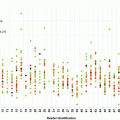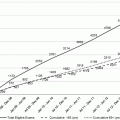Fig. 9.1
Volume of potentially discretionary anesthesia service use and associated payments among medicare fee-for-service patients during 2003–2009. (Reprinted from [26]. With permission from American Medical Association)
Additional studies have provided similar conclusions. Medicare claims between 2001 and 2006 revealed an increase in the use of anesthesiology professionals with screening colonoscopies from 11 to 23 % during this period [4]. Surprisingly, comorbidity was not associated with an increase in the use of anesthesiologists; however, anesthesia professionals’ use increased as patients’ income increased, but was significantly reduced among Blacks compared with Whites. The authors calculated that the additional sedation costs due to anesthesia involvement in screening colonoscopy during this time period totaled US$ 20 million but would have reached US$ 120 million had anesthesia services been provided for all screening colonoscopies.
Can Propofol be Administered by Nonanesthesia Professionals?
It is clear that addition of anesthesia services to provide sedation increases the cost of colonoscopy. The economics of sedation , therefore, revolve around the requirement for propofol to be administered by an anesthesia professional. Several studies have demonstrated the safety of nonanesthesia professional administered propofol (NAAP) for gastrointestinal endoscopic procedures. A systematic review of randomized controlled trials comparing NAAP with traditional sedation in patients undergoing routine upper endoscopy and colonoscopy found no significant difference in hypoxemia, bradycardia, or hypotension [27]. The American Gastroenterological Association Position Statement on NAAP for GI endoscopy concludes that the safety profile of NAAP is equivalent to that of standard sedation with respect to the risks of hypoxemia, hypotension, and bradycardia for upper endoscopy and colonoscopy. Further, NAAP sedation improves practice efficiency compared to standard sedation and the use of anesthesia-administered sedation for healthy, low-risk patients undergoing routine GI endoscopy results in higher costs with no proven benefit with respect to patient safety or procedural efficacy [28].
There are now alternatives in the manner in which propofol may be administered during routine colonoscopy. A computer-assisted sedation system integrating propofol delivery with patient monitoring has been approved by the FDA to enable endoscopists and nurses to administer propofol without an anesthesia professional. In a multicenter randomized study, 496 patients undergoing routine colonoscopy or upper endoscopy were randomized to receive sedation using the computer-assisted sedation system versus traditional sedation with narcotic and benzodiazepine [29]. Oxygen desaturation was significantly lower in the computer-assisted sedation system arm and the overall incidence of adverse events was not significantly different (5.8 % computer-assisted sedation versus 8.7 % traditional sedation).
Summary
Who gains when propofol is administered during colonoscopy? The efficiency of an endoscopy unit may improve with propofol sedation due to increased throughput. Patients may have greater satisfaction with colonoscopy and perhaps may be motivated to repeated screening and surveillance due to reduced anxiety and fears of colonoscopy. While some studies highlight a concern that adverse events such as perforation could be increased due to limited patient feedback with deep sedation, this is not a consistent finding. There is no evidence, however, that anesthesia administration of sedation improves colonoscopy quality metrics such as adenoma detection rates .
In the absence of clear evidence demonstrating harm or benefit, the gastroenterology and anesthesia communities should determine whether the benefit from anesthesia services is worth the financial costs, particularly in population screening for colorectal cancer where the emphasis is on less-expensive tests to increase access and cost-effectiveness. The economic debate should also focus on the scientific basis for the requirement that propofol and similar sedation agents be administered by anesthesia professionals. In addition to clinical studies demonstrating safety of propofol administration by nonanesthesiologists, there are technological advances that may allow these drugs to be safely delivered in a setting sufficiently monitored so as to mitigate the potential risks of deep sedation with these agents.
References
1.
2.
U. S. Preventive Services Task Force. Screening for colorectal cancer: recommendation and rationale. Ann Intern Med. 2002;137(2):129–31.CrossRef
3.
4.
Khiani VS, Soulos P, Gancayco J, Gross CP. Anesthesiologist involvement in screening colonoscopy: temporal trends and cost implications in the medicare population. Clin Gastroenterol Hepatol. 2012;10(1):58–64e51.CrossRefPubMedCentralPubMed
Stay updated, free articles. Join our Telegram channel

Full access? Get Clinical Tree





